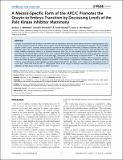A Meiosis-Specific Form of the APC/C Promotes the Oocyte-to-Embryo Transition by Decreasing Levels of the Polo Kinase Inhibitor Matrimony
Author(s)
Chisholm, Jennifer; Hawley, R. Scott; Orr-Weaver, Terry; Whitfield, Zachary J.
DownloadWhitfield-2013-A Meiosis-Specific F.pdf (890.0Kb)
PUBLISHER_CC
Publisher with Creative Commons License
Creative Commons Attribution
Terms of use
Metadata
Show full item recordAbstract
Oocytes are stockpiled with proteins and mRNA that are required to drive the initial mitotic divisions of embryogenesis. But are there proteins specific to meiosis whose levels must be decreased to begin embryogenesis properly? The Drosophila protein Cortex (Cort) is a female, meiosis-specific activator of the Anaphase Promoting Complex/Cyclosome (APC/C), an E3 ubiquitin ligase. We performed immunoprecipitation of Cortex followed by mass spectrometry, and identified the Polo kinase inhibitor Matrimony (Mtrm) as a potential interactor with Cort. In vitro binding assays showed Mtrm and Cort can bind directly. We found Mtrm protein levels to be reduced dramatically during the oocyte-to-embryo transition, and this downregulation did not take place in cort mutant eggs, consistent with Mtrm being a substrate of APC[superscript Cort]. We showed that Mtrm is subject to APC[superscript Cort]-mediated proteasomal degradation and have identified a putative APC/C recognition motif in Mtrm that when mutated partially stabilized the protein in the embryo. Furthermore, overexpression of Mtrm in the early embryo caused aberrant nuclear divisions and developmental defects, and these were enhanced by decreasing levels of active Polo. These data indicate APC[superscript Cort] ubiquitylates Mtrm at the oocyte-to-embryo transition, thus preventing excessive inhibition of Polo kinase activity due to Mtrm's presence.
Date issued
2013-09Department
Massachusetts Institute of Technology. Department of Biology; Whitehead Institute for Biomedical ResearchJournal
PLoS Biology
Publisher
Public Library of Science
Citation
Whitfield, Zachary J., Jennifer Chisholm, R. Scott Hawley, and Terry L. Orr-Weaver. “A Meiosis-Specific Form of the APC/C Promotes the Oocyte-to-Embryo Transition by Decreasing Levels of the Polo Kinase Inhibitor Matrimony.” Edited by David Pellman. PLoS Biology 11, no. 9 (September 3, 2013): e1001648.
Version: Final published version
ISSN
1545-7885
1544-9173